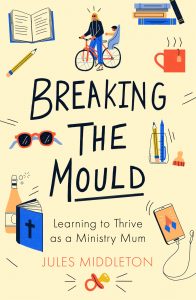Breaking the Mould – a book review
‘Breaking the Mould’ by Jules Middleton
At first this could appear to be a niche book which mightn’t appeal to me as, although I’m an ordained minister, I have never had children. However, there were so many more touch-points in the book than I’d imagined there might be – and, on top of that, it is a good and enlightening read.
Jules Middleton’s writing style is chatty and honest, with more than a touch of humour. This approach reflects her deep thinking on the topic, and presumably also her personality. Despite her relatively informal style, she certainly doesn’t avoid some of the more difficult questions of being a working mother in an occupation which makes huge personal demands – and sometimes gives the impression that it owns both the ‘employees’ and their families.
As a married women in ministry myself, and one married to another clergy person at that, I recognised many of the competing demands that Jules highlights – in particular those reflected in the title itself: “Breaking the Mould”. “You’re not a normal wife and/or minister” has been thrown at me more times than I can mention, as has the title ‘the funky vicar’ in my recent workplace chaplaincy role. This resonates very much with the “you really are a breath of fresh air” often directed at Jules, as well as the feeling she had initially of not being a ‘typical mum’ nor an ‘average vicar’. All of these phrases can be taken as both a compliment and the opposite. As Jules says fairly early in chapter 1:
How many of us have forgotten how unique we are…[and]…are trying to fit into someone else’s identity? … we need to embrace who we are, rather than who we think we are supposed to be.
This discussion on the need both to avoid and also to challenge stereotypes is a valuable section of the book that many need to read and take heed of, not just ministers and mothers. Other similarly important discussions that all ministers could benefit from reading, as well as those in other occupations, are found in the chapters on formation (and transformation), sacrifice, and sabbath (or rest day).
With regard to what some may call work-life balance, in this increasingly fast-moving world we all need to heed the injunction quoted from ‘The Message’ translation of Romans 12:11 “Don’t burn out; keep yourself fuelled and aflame”. In making sure that we look after ourselves, I found the encouragement to discern ‘what drains us and what energises us’ to be a helpful one. Likewise Jules’ in-depth understanding of the word ‘Selah’ – but you’ll have to read her book to find out more about that!
The book follows an easy and straightforward pattern, with each chapter starting with a relevant quotation and ending with a personal story from another ‘ministry mum’. So, voices other than Jules’ are heard. Each chapter has a good balance of reflection on both Biblical and contemporary writing from a variety of contexts. The initial introduction and final summary book-end the eight chapters very well. I would commend this book to all potential and present ‘ministry mums’, as well as to other clergy and ministers, especially perhaps those in senior positions who might have oversight within a church context. I would also commend the book to those who are not clergy or church ministers but who see their work as a vocation whatever their occupation. As Jules says:
All of us, whoever we are and whatever we do, have a calling from God to be and to do
‘Breaking the Mould’ is published by SPCK Publishing It is available from all good Christian bookshops as well as from Amazon and other online sites.

